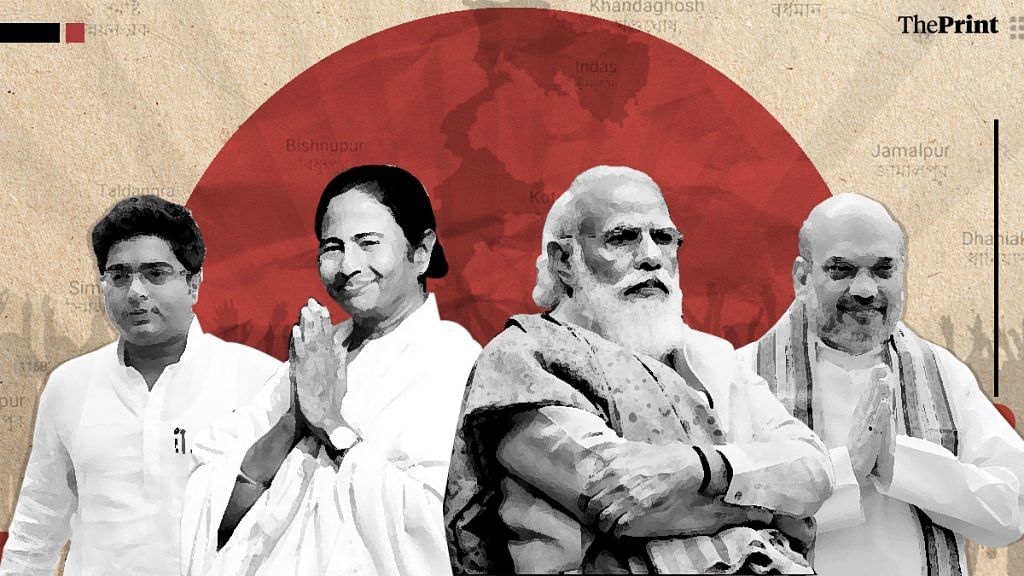West Bengal is the perfect case study to figure out what works best in the muddy waters of Indian politics: hyper Hindu nationalism or hyper strategising. And with the assembly election just a few months away, both the Trinamool Congress and the Bharatiya Janata party have their A-game on. For the BJP, it’s Union Home Minister Amit Shah and party’s Bengal president Dilip Ghosh holding the fort with their vitriol. Challenging them is Chief Minister Mamata Banerjee’s nephew Abhishek and election strategist Prashant Kishor with their reorganisation of the TMC. What wins is anybody’s guess. While Amit Shah has claimed the BJP would get more than 200 seats in the 294-member assembly, Prashant Kishor has challenged it and said he will quit politics if the BJP even manages to cross double digits. Evidently, both are working tooth and nail to that end.
But their approach is poles apart.
The BJP is sticking to its vulgar hyperbole, relying on Hindutva, Bangladeshi infiltrators (read Muslims), talks of “revenge”, and insulting the ‘bhaipo’ of TMC – Abhishek Banerjee. The TMC is playing a subtle game. It is going the development way, speaking of a ‘Duare Sarkar’ or a government constantly in service at your doorstep. With 11 flagship welfare schemes directed at women’s empowerment, employment generation, health, community development and girl education, the TMC is trying to hem in Bengal voters with its own version of ‘vikas’. Both these campaign tactics are predictable. But what works in Bengal is not.
West Bengal is a curious case of ideologies. It’s as if people of the state change their core political leanings drastically every two decades. While the 1970s and the ’80s was dominated by the Left, the ’90s and the 2000s were led by the Congress-TMC’s centrist views. But now, Bengal seems to have taken a sharp Right-ward turn in the way it thinks politically. The huge gain in the BJP’s vote share in the 2019 Lok Sabha election – from 10.3 per cent (in the 2016 assembly election) to 40.3 per cent – in spite of Mamata Banerjee’s aggressive verbal takedowns of Narendra Modi and Amit Shah is indicative of this trend. But Banerjee’s hold over her electoral vote base too cannot be ignored. Her party managed to retain 43.3 per cent vote share in 2019. This was at the peak of Narendra Modi’s popularity.
Also read: BJP, media, MHA — slander on Muslims and Sikhs have a lot in common. Outcome will be too
Problems galore for TMC
There are several chinks in the TMC’s armour. While the BJP takes pride in being a favourable option for leaders being wronged by dynasts like the Gandhis and now the Banerjees, the TMC camp is beset by leaders disgruntled with Abhishek Banerjee and Prashant Kishor taking over the charge of party affairs. Already, big vote-getters like Mukul Roy, Sovan Chatterjee and Suvendu Adhikari have left the TMC. And the BJP is leaving no stone unturned to malign Abhishek the way it did Rahul Gandhi, calling the West Bengal government ‘pishi-bhaipo sarkar’ or the government of the aunt and her nephew.
These jibes at Mamata Banerjee affect her image of ‘Ma Mati Manush’ (mother, motherland and people). It was this image of a sincere woman clad in a white cotton sari and a rubber chappal working for her motherland and its people at the grassroots or ‘trinamool’ that helped her come to power. And the BJP is reinforcing this betrayal of a sincere woman who has turned into an autocrat trying to bring her nephew as the heir to her throne. Union minister Gajendra Singh Shekhawat recently said that Mamata Banerjee has “cheated” the ‘Ma Mati Manush’ of West Bengal.
Also read: Yogi vs Modi has begun. And it will get interesting before 2024
The CAA-NRC bogey
But the BJP too is unable to hide the chinks in its armour. While the supportive media plays the defections from the TMC to the BJP on loop, no one seems to mention the man who owed the largest chunk of victory to the BJP in 2019 – fugitive Gurkha leader Bimal Gurung. His Gorkha Janmukti Morcha (GJM) quit the BJP-led NDA and is back with the TMC. Gurung, who brought the BJP to power in seven of the eight Lok Sabha seats in north Bengal in 2019, has now vowed to teach the BJP a lesson in the upcoming election.
There’s another factor that could prove disadvantageous for the BJP – the coinciding assembly election in Assam. BJP leaders, including Amit Shah, have repeatedly spoken of implementing the Citizenship Amendment Act (CAA) and the National Register of Citizens (NRC) exercise in West Bengal since 2019. The coinciding Assam election and the party’s “internal survey” – as a top leader told journalist Himadri Ghosh of The Wire – has made the BJP drop the pitch for now, with Amit Shah even turning evasive to journalists’ questions on CAA-NRC.
And so, Amit Shah has instead relegated Dilip Ghosh to target Mamata Banerjee and he is doing just that. Recently, Ghosh abused Mamata, calling her “bastard” and saying she was “trying to convert Bengal into Bangladesh”. But the CAA-NRC finds no mention anymore. Whether the people of Bengal are noticing this is up for speculation.
The Bengali pride of the Gujaratis is also amusing. While Narendra Modi is quite obviously fashioning himself after Rabindranath Tagore, which I had written about earlier, the BJP’s ‘star campaigners’ have a huge disadvantage of language when compared to the TMC. While Trinamool leaders are all homebred and true blue Bangalis, the BJP is relying completely on two Gujaratis to convince the people of Bengal that their culture will be celebrated. This, from people who are also hell-bent on imposing Hindi in the south and the northeast.
The author is a political observer and writer. Views are personal. Views are personal.
